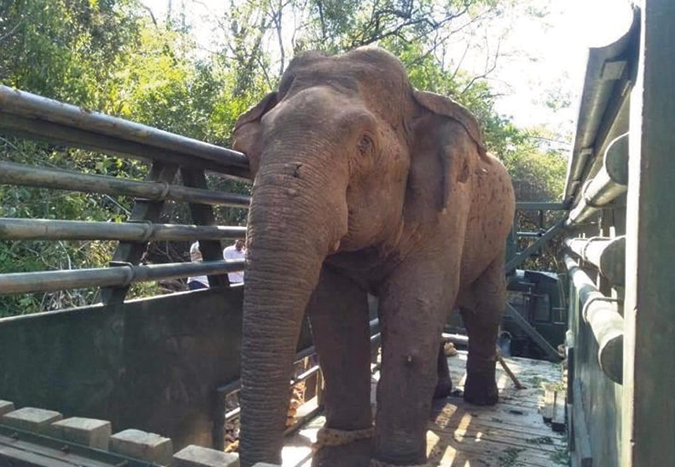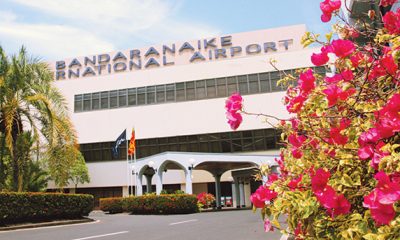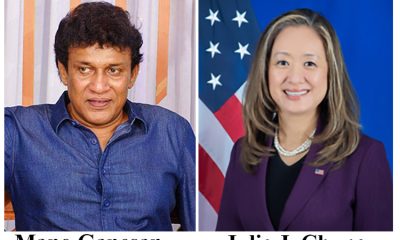News
So-called experts blind to what is exacerbating human-elephant conflict

By Rathindra Kuruwita
Given that abusive land use patterns are the main reason for human-elephant conflict, one of the best ways to address this issue is the establishment of the National Land Commission, as stipulated by the 13th Amendment to the Constitution, environmentalist Sajeewa Chamikara told The Island.
The establishment of the Commission will minimize the ability of the governments to misuse land to benefit their political and business allies, at the expense of public welfare and the environment, he said.
“There is a lot of talk about full implementation of the 13A. However, no one talks about the Land Commission because this will be politically inconvenient,” he said.
Addendum II of the 9th schedule of the 13th Amendment states that a National Land Commission must be established. One of the main tasks of the National Land Commission is the preparation of a National Land Policy. However, the National Land Commission has not been established yet, although the 13th Amendment was passed in 1987, he said.
“The law states that the government must establish a National Land Commission, that it must prepare a National Land Policy and that representatives from all provinces must be represented in this Commission. The Commission needs a secretariat that has the technical capacity to analyze the social, economic and physical aspects of land use. The law also states that the National Land Policy must be based on science and not on political or ethnic factors. The Commission must look at soil, weather, rainfall, soil erosion, forest cover, environmental and economic factors and come up with general principles on land use. The Provincial Councils must implement their policies, based on the National Land Policy,” he said.
None of the governments have been interested in implementing this because it can prevent land grabbing and deforestation to the benefit of the rich and powerful, he said.
Chamikara said that even the biggest proponents of 13A ignore this provision because almost everyone is tied to big business.He pointed out that there are several bad land use practices that are intensifying the human-elephant conflict.
One of the main reasons for increasing the human-elephant conflict is that the elephants are running out of food, inside the forests, due to human activities, the environmentalist said.
He said that in Hambantota a large number of cattle are let loose in Lunugamvehera, Udawalawa, Madura Oya and Gal Oya national parks due to the influence of parliamentarians. The cows eat plants that are usually consumed by elephants, and other wild animals, and this has resulted in elephants entering human settlements in search of fodder.
“Some people, who live close to the forests, expand their farmlands and build new houses, after cutting down trees. In the past few decades, several invasive plant species, too, have spread into forests, replacing plants that were consumed by animals. Moreover, forests are increasingly getting fragmented, and the government has no plans to control these developments. All these compel elephants to enter villages,” he said commenting on the increased human- elephant conflict in Hambantota.
Chamikara said that the attempts to regrow forests with trees that only have value as timber, i.e., teak, also contribute to the human-elephant conflict because these trees do not provide food for animals. Another factor that attracts elephants to these villages is the establishment of garbage dumps. Elephants and other animals who have been starved are attracted to these garbage dumps.
“The Cabinet paper, titled ‘Taking action to prevent elephants from being attracted to garbage dumps,‘ which was approved by the Cabinet of Ministers, on 30 May, 2017, stated that there are 54 such garbage dumps that are attracting elephants. These sites are located in the dry and intermediate zones of Sri Lanka,” he said.
In addition, some people, who live in the dry and intermediate zones, set fire to forests during the dry season (July/September). This is another reason for elephants to come into villages. The recent forest fire that destroyed over 2,000 palmyrah trees in Kilinochchi can be one such fire, he said.
“There are a large number of forests, where elephants live, that come under the purview of the Mahaweli Authority and the Forest Conservation Department. However, when electric fences are established,the above-mentioned forests are ignored often and only forests that come under the Wildlife Conservation Department are fenced. Moreover, some of these fences are erected, obstructing the paths elephants use to reach tanks during the dry season. In recent years, a number of human settlements have been established, covering the above-mentioned paths,” he said.
In recent times, companies and powerful businessmen, who run large scale commercial agricultural projects and other development projects, have started erecting electric fences without considering how these would affect the human-elephant conflict, Chamikara said. These leave villages, and the farms of small scale farmers, more exposed to elephants.
“Most of the electric fences are substandard, are not properly maintained, and bio barriers have not been established along the fences. These make these fences ineffective,” he said.
News
US sports envoys to Lanka to champion youth development

The U.S. Embassy in Colombo welcomed the U.S. Sports Envoys to Sri Lanka, former National Basketball Association (NBA) and Women’s National Basketball Association (WNBA) players Stephen Howard and Astou Ndiaye, from June 8 through 14.
The Public Diplomacy section of the U.S. Embassy said that it would launch a weeklong basketball program intended to harness the unifying power of sports, made possible through collaboration with Foundation of Goodness and IImpact Hoop Lab.
While in Sri Lanka, Howard and Ndiaye, both retired professional basketball players, will conduct a weeklong program, Hoops for Hope: Bridging Borders through Basketball. The Sports Envoys will lead basketball clinics and exhibition matches and engage in leadership sessions in Colombo and Southern Province for youth aged 14-18 from Northern, Uva, Eastern and Western Provinces, offering skills and leadership training both on and off the court. The U.S. Envoys will also share their expertise with the Sri Lanka Basketball Federation, national coaches, and players, furthering the development of basketball in the country. Beyond the clinics, they will collaborate with Sri Lankan schoolchildren to take part in a community service project in the Colombo area.
“We are so proud to welcome Stephen and Astou as our Sports Envoys to Sri Lanka, to build on the strong people-to-people connections between the United States and Sri Lanka,” said U.S. Ambassador Julie Chung. “The lessons that will be shared by our Sports Envoys – communication, teamwork, resilience, inclusion, and conflict resolution – are essential for leadership development, community building, equality, and peace. The U.S. Sports Envoy program is a testament to our belief that sports can be a powerful tool in promoting peace and unity.”
News
Rahuman questions sudden cancellation of leave of CEB employees

SJB Colombo District MP Mujibur Rahuman in parliament demanded to know from the government the reasons for CEB suspending the leave of all its employees until further notice from Thursday.
MP Rahuman said that the CEB has got an acting General Manager anew and the latter yesterday morning issued a circular suspending leave of all CEB employees with immediate effect until further notice.
“We demand that Minister Kanchana Wijesekera should explain this to the House. This circular was issued while this debate on the new Electricity Amendment Bill was pending. There are many who oppose this Bill. The Minister must tell parliament the reason for the urge to cancel the leave of CEB employees,” the MP said.However, Speaker Mahinda Yapa Abeywardena prevented Minister Wijesekera responding to the query and said that the matter raised by MP Rahuman was not relevant.
News
CIPM successfully concludes 8th Annual Symposium

The Chartered Institute of Personnel Management (CIPM) successfully concluded the 8th Annual CIPM Symposium, which took place on 31st May 2024. Themed “Nurturing the Human Element—Redefining HRM in a Rapidly Changing World,” the symposium underscored the pivotal role of human resource management (HRM) in today’s dynamic global landscape. Since its inception in 1959, CIPM has been dedicated to advancing the HR profession through education, professional development, and advocacy, solidifying its position as Sri Lanka’s leading professional body for HRM.
Ken Vijayakumar, the President of the CIPM, graced the occasion as the chief guest. The symposium commenced with the welcome address by the Chairperson, Prof. Arosha Adikaram, followed by the Web Launch of the Symposium Proceedings and Abstract Book by the CIPM President. The event featured distinguished addresses, including a speech by Chief Guest Ken Vijayakumar, President of CIPM, and an address by Guest of Honor Shakthi Ranatunga, Chief Operating Officer of MAS Holdings Pvt. Ltd., Sri Lanka.
The symposium also featured an inspiring keynote address by Prof. Mario Fernando, Professor of Management and Director of the Centre for Cross Cultural Management (CCCM) at the University of Wollongong, Australia.
Vote of Thanks of the inauguration session was delivered by Dr. Dillanjani Weeratunga, Symposium Co-chair.
The symposium served as a comprehensive platform for researchers to present their findings across a wide range of critical topics in HRM. These included Cultural Diversity and Inclusion, Talent Development and Retention, Ethical Leadership and Corporate Social Responsibility, Adapting to Technological Advancements, Mental Health and Well-being at Work, Global Workforce Challenges, Employee Empowerment, and Reskilling and Upskilling.
The plenary session was led by Prof. Wasantha Rajapakse. Certificates were awarded to the best paper presenters during the valedictory session, followed by a vote of thanks delivered by Kamani Perera, Manager of Research and Development.
The annual symposium of CIPM was a truly inclusive event, attracting a diverse audience that spanned undergraduates, graduates, working professionals, research scholars and lecturers. This widespread interest highlights the symposium’s significance in the field of HRM, offering a unique opportunity for everyone to network and learn from scholarly brains.The CIPM International Research Symposium was sponsored by Hambantota International Port, Sri Lanka Institute of Information Technology (SLIIT), E B Creasy & Co. PLC, and Print Xcel Company.
























